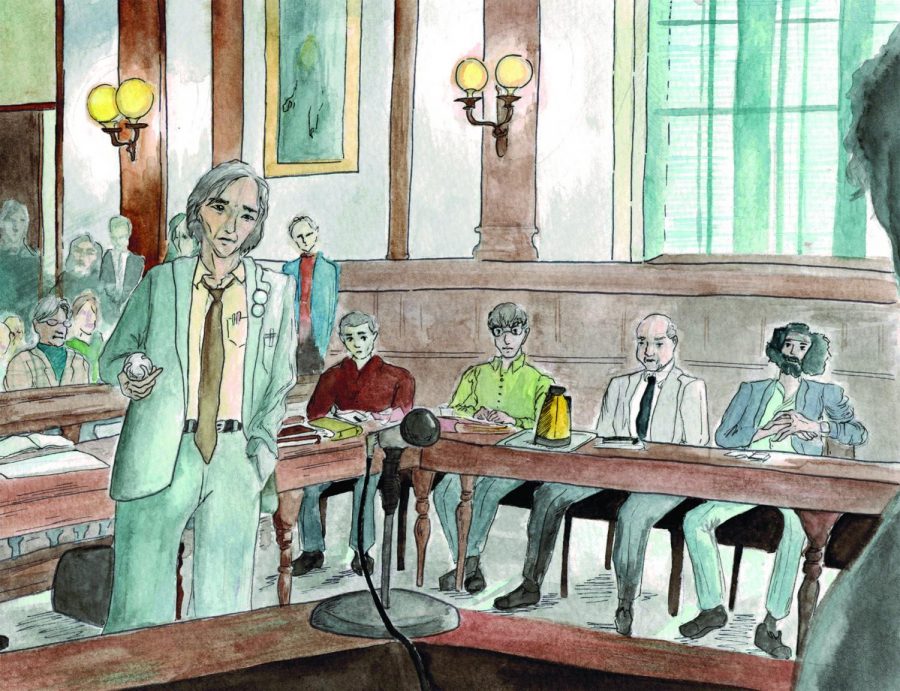Verdict on ‘The Trial of the Chicago 7’
Rating: 2.5/5 stars
In the midst of protests against racial injustice and the U.S. government, renowned filmmaker Aaron Sorkin’s “The Trial of the Chicago 7” has had a perfectly timed release on Netflix. The film depicts the infamous 1969 trial of seven anti-Vietnam War protestors charged with inciting riots near the Democratic National Convention, and although it has strengths and entertainment value, this courtroom drama ultimately leaves much to be desired.
The defendants in the trial were countercultural leftists Abbie Hoffman and Jerry Rubin; student activists Tom Hayden and Rennie Davis; and pacifists David Dellinger, John Froines and Lee Weiner. Black civil rights leader Bobby Seale barely attended the protests, yet was also put on trial. As for the trial itself, it quickly morphed into a crude miscarriage of justice. Overseen by the heavily biased Judge Julius Hoffman, various charges were handed out against the defendants on a dime, jurors in support of the defendants were removed and planted witnesses testified to give police an edge.
Writer-turned-director Sorkin has devised many courtroom dramas for both stage and screen , his most popular being “A Few Good Men.” In many ways, “The Trial of the Chicago 7” is his way of harkening back to the courtroom drama subgenre, and he’s effective at bringing many of the trial’s most unjust and shocking moments to life. The symbolically racist gagging of Seale in court, the removal of an important witness without the presence of the jury and other notable obstructions serve as resonant, albeit overdramatized, moments.
These moments are given further energy by the ensemble cast, which includes actors Eddie Redmayne, Sacha Baron Cohen, Mark Rylance and Frank Langella. All performers across the board are incredible, as each of them brings out a distinct sense of personality with their characters. Viewers of Sorkin’s previous works will also be pleased to hear that his fast-paced screenwriting style remains unchanged, delivering quippy one-liners whenever an opportunity arises.
Some of Sorkin’s more dramatic scenes don’t fully deliver a strong emotional impact, a symptom of his own breezy, theatrical aesthetic. For one, his brand of smart-aleck dialogue is much more suited for the Harvard-undergraduate founders of Facebook in “The Social Network” or the White House staffers of “The West Wing” than it is for protestors who weren’t as verbose in real life. The end result is a story that feels both inorganic and rushed in its drama.
Sorkin’s interpretation of the trial also includes profound inaccuracies in portraying characters and scenes, which wouldn’t be as much of a problem if he had accurately reflected the real-life figures’ ideologies. For instance, the strictly nonviolent Dellinger punches a bailiff in a completely fictional outburst, and ruthless “bulldog” prosecutor Richard Schultz instead appears hesitant and conflicted.
While “The Trial of the Chicago 7” draws historical parallels to the current political climate with themes of law and order, police brutality and political corruption, certain lacking aspects prevent it from being a true depiction of the trial and its outcome. Sorkin could be much more conscious of his own methods in the future. There’s a time and place for his style, but when talking about one of the most politically charged trials in American history, his experience with courtroom dramas is not enough to accurately reflect the subject material. Sorkin’s talents as a writer and filmmaker hold up overall, but his tendency for over-dramatization works against him more than it should.


